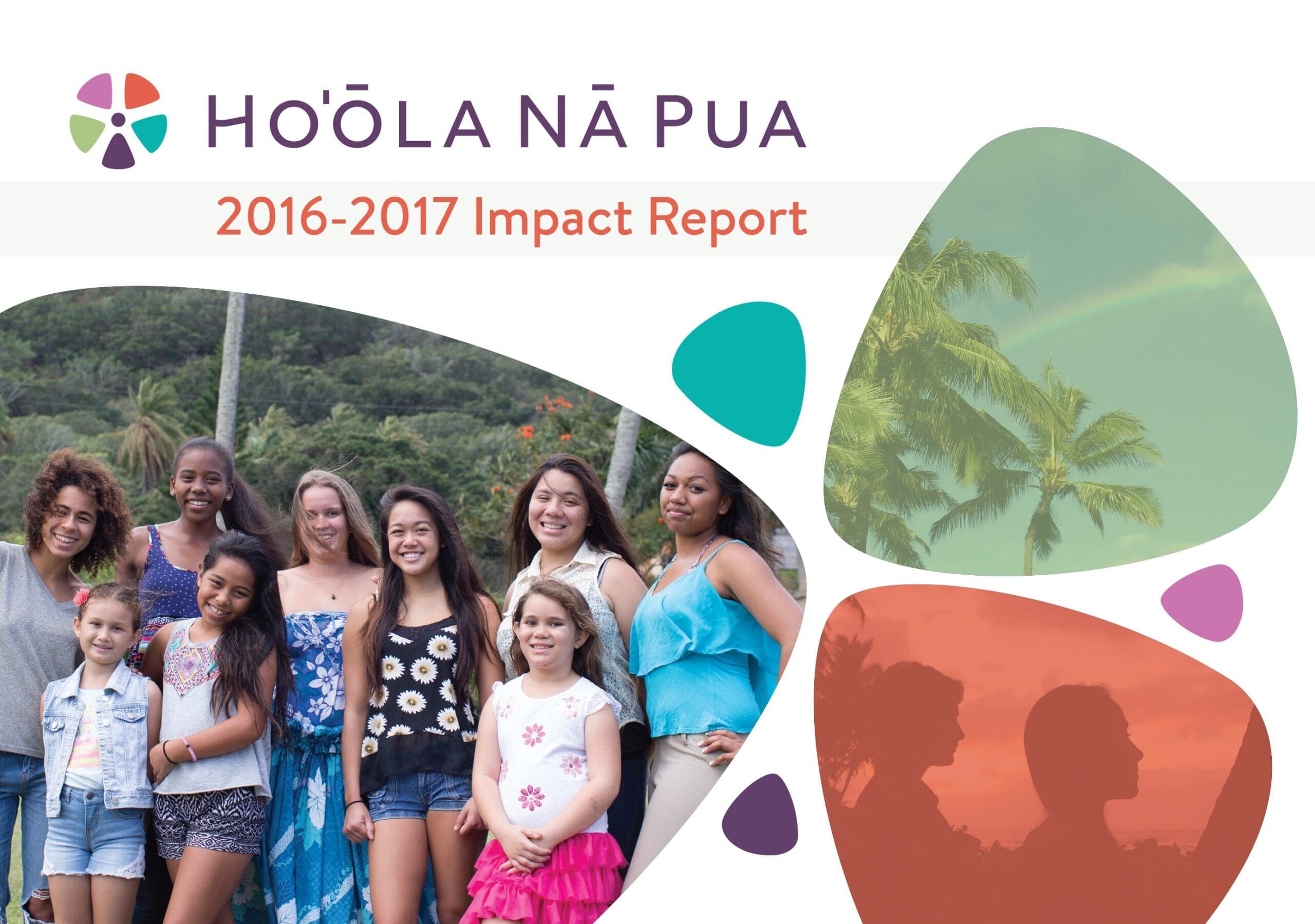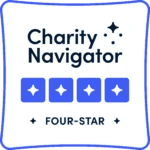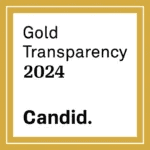HNP is one element in the global anti sex trafficking response network. Collectively we can create the impact needed to end child exploitation.
2016–2017 Impact Report Highlights
What We Have Accomplished So Far
 With help from sponsors like you, between 2016 and 2017 we have been able to mentor 27 girls weekly, educate 210 kids monthly and volunteered 8,000 hours annually. This has impacted 9 million people globally.
With help from sponsors like you, between 2016 and 2017 we have been able to mentor 27 girls weekly, educate 210 kids monthly and volunteered 8,000 hours annually. This has impacted 9 million people globally.
Starfish Mentoring Program (SMP)
The vision of Ho‘ōla Nā Pua’s Starfish Mentoring Program (SMP) is that no survivor of sex trafficking is ever left without the support of a caring adult to help guide them toward healing, renewal and successful social reintegration. SMP offers a variety of services: one-to-one mentoring, HOKU (group activities in facilities), a family support group, and specialized agency training.
“No matter the source of hardship, the single most common factor for children who end up doing well is having the support of at least one stable and committed relationship with a parent, caregiver, or other adult.”- Center on the Developing Child, Harvard University
One-to-one mentoring
The one-to-one mentoring is a structured program that provides community based, trauma-informed care and support through comprehensive mentoring that addresses the unique needs of survivors of commercial sexual exploitation of children (CSEC) and those at risk (ages 11-21).
Extensively trained mentors offer support, advocacy, and serve as positive role models in addition to providing weekly activity-based outings and meetings with youth at facilities, shelters, and other placements. Activities are selected to encourage forward-thinking, self-empowerment, and pro-social skills.
HNP has been providing mentoring and advocacy for several years; however, it was in 2016 that the program was formalized and named the Starfish Mentoring Program. The newly developed program was implemented mid 2016 with a small team of staff and volunteers committed to investing the time and effort necessary to ensure the highest quality of care.
SMP mentors have been privileged to celebrate successes with their mentees such as returning to high school and earning diplomas, entering college and trade schools, getting driver licenses, getting jobs, discovering new talents and hobbies, recognizing and building safe friendships, and staying out of “the life.”
The heartbreaking reality is that many CSEC survivors create trauma bonds with their traffickers and often return to them. In mentoring this population, we learn to redefine success and celebrate every small step in the right direction. When a mentee was asked how mentoring has impacted her after 1 ½ years in the program, she leaned in and said, “I’m still here.” You see, for highly traumatized youth, there is often a sense of hopelessness and an inability to envision a positive future, if any future at all. The mentee went on to say that she, in turn, has been able to encourage her peers to look forward to better days when they were “on the verge.”
HOKU group activities
HOKU GROUP ACTIVITIES SMP holds weekly group activities (HOKU) in facilities for girls identified as high risk or victims of CSEC. This service is currently offered at Hawai‘i Youth Correctional Facility (Kailua), Hale Ho‘omalu (Kapolei), and Noho Olu Safehome (Hawai‘i Island). By definition, girls in the juvenile justice system and in the care of social services are at higher risk of CSEC victimization and many have been identified as victims. SMP offers services at these facilities in alignment with the oneto-one mentoring service with the purpose of preventing further victimization and establishing protective factors via activities that build life skills and encourage self-empowerment. CONNECTION AND CONSISTENCY are two major factors that aid healing in trauma survivors. For youth who have been traumatized, there is a general distrust of all adults which makes establishing new connections difficult. In the majority of cases, youth in facilities have experienced early childhood trauma. Research shows that childhood trauma often manifests in reactive behaviors, which may escalate into “criminal” activity. HNP serves girls in facilities because we aim to be a part of a solution that disrupts the cycle of abuse/trauma leading to reactive/criminal behaviors that inevitably sends the youth back into the juvenile justice system. A productive disruption of this cycle can happen through trauma-informed care. While lessons and activities are planned for HOKU sessions, the underlying goals of the weekly meetings are just as important.
Family Support Services
An MSW facilitates peer support groups for families of victims. Parents of victimized children face challenges and heartbreak that few can even imagine. There is a general misunderstanding of the trauma their children have experienced and lack of knowledge about appropriate aftercare for the victimized child and their siblings. Besides not knowing how to respond to a child that has changed significantly due to their unique traumatic experiences, they are also faced with shame, guilt, and feelings of inadequacy. They report feeling lost and alone without a roadmap in their journey to healing as a family.
Specialized Agency Training
SMP provides specialized agency training to agencies that provide direct-care services or may interact with CSEC survivors. The aim of this service is to define the issue, encourage appropriate responses to the unique needs of survivors, and increase referrals and collaboration amongst disciplines and agencies.
2016-2017 Impact Numbers
- Agency Training- continues to provide cross sector multi-disciplinary trainings for judiciary, social service providers, and other NGOs.
- milestone 1: HOKU implemented its first group session in November 2016 at one location and expanded to 2 additional locations in 2017
- milestone 2: First SMP mentor training – June 2016 and held quarterly since.
- impact story – having a friend that she could talk to was important, but having a friend she could tell others about gave her a sense of empowerment that raised her self-esteem. She began to see her value as a human being, rather than a commodity.
- HNP’s Starfish Mentoring Program serves an average 27 youth each week, reaching 90 at-risk and trafficked youth over 2016-2017 through individual mentoring and HOKU group activities.
Education
Our prevention-based education program is geared towards middle and high school students through college aged students. Our focus is Education & Prevention: Sex Trafficking of Minors in Hawai`i.
Local Reach
HNP reached an estimated 43,675 individuals in the community through events, trainings, and community presentations.
Milestone 1
Formalizing the Prevention Education Program. HNP completed and began implementing its version 1.0 formalized Prevention Education Program educating students and the community. The age-appropriate and student-centered presentation offers comprehensive training on important information including who is at risk for becoming a victim, what some of the warning signs are, why it happens in Hawai’i and how to get help. This also includes important information on the dangers of social media and gaming and how to keep safe and use the internet wisely. Finally, it includes the science of pornography addiction and how pornography is the platform for Human Trafficking.
Milestone 2
Part of the process for formalizing this Prevention Education Program was recruiting a teen board to review the materials and offer feedback. They developed the idea for the Student Resource Card which is now given out to all students at all presentations. In 2016, 2057 middle school to college aged students in 10 schools and in 2017, 1888 middle school to college aged students in ~19 schools or venues were reached.
Milestone 3
HNP trained its first volunteer Education Advocates on two islands. On O’ahu 20 volunteer Education Advocates were trained while on Hawai`i Island 8 volunteer Education Advocates were trained. This is currently an initial 18 hours of training (web-based, CSEC, Train the Trainer) with 4-6 more hours of presentation training as well as an additional 16 hours of continued training via quarterly workshops.
Milestone 4
HNP has been raising awareness and increasing community involvement around the issue of underage sex trafficking through community awareness events, e.g., Human Trafficking Awareness Walk & Fair; Good Deeds Day; Make A Difference Day; educational presentations to youth, young adults and the community at large; Volunteer Orientation & Advocate Trainings (VOAT), Commercial Sexual Exploitation of Children (CSEC) Trainings, Train the Trainer as well as many community outreach events.
Milestone 5
In 2016 HNP started inviting college students to intern. These students were from UH West O’ahu, Corban University as well as Biola University. In 2017 HNP partnered for the first time with Kamehameha Schools Kapili ‘Oihana Internship Program becoming a site host for student interns.
Volunteers
HNP was initially 100% volunteer driven, but with the addition of a few paid staff and contracted team members, it is now volunteer supported. Without this incredible volunteer support, HNP’s programs would not have grown as quickly. Our volunteers are the backbone of this organization. It is the hearts and passion of these volunteers that make a difference in the programs, outreach, advocacy and education within our community. Our volunteers are active mentors, education advocates, regional coordinators, community and donor advocates. They come from varying backgrounds from high school and college students to professionals in accounting, law, health care, education, business and more. Our volunteer program also partners with other organization’s volunteers in community events. Our volunteers are the heart and soul of HNP.
2016-2017 impact number
HNP trained ~124 new volunteers in 2016 and ~170 in 2017. Volunteers logged over 8,000 hours each year.
MAHALO TO OUR SUPPORTERS AND SUSTAINING DONORS 2016-2017
The work to help the Keiki of Hawaii and beyond would not be possible without our donors visit this link to view their names: www.hoolanapua.org/impact
Please consider donating to help continue to make this dream a reality.
Take Action Now



